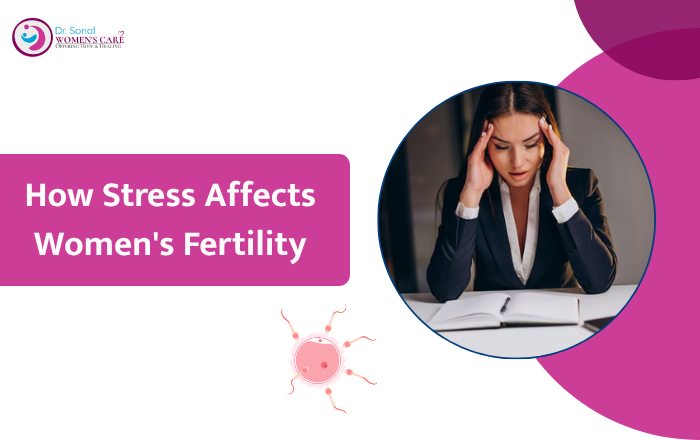If you’ve been trying to get pregnant and it just isn’t happening, you’re not alone. For many women, the journey to motherhood can be filled with emotional ups and downs. One surprising factor that often gets overlooked is stress. Yes, stress doesn’t just affect your mood—it can play a powerful role in your ability to conceive. Understanding how stress affects women’s fertility is a crucial step in overcoming the obstacles that may be holding you back.
1. What Happens to Your Body Under Stress?
When you’re stressed, your body releases hormones like cortisol and adrenaline. These are natural responses designed to protect you in short bursts. But when stress becomes constant, it can start interfering with your reproductive system.
- Cortisol can disrupt the balance of estrogen and progesterone—two hormones that are essential for ovulation and a healthy menstrual cycle.
- The brain’s hypothalamus, which controls the hormones that regulate your cycle, can be affected by prolonged stress, leading to irregular periods or missed ovulation.
Long-term stress can create a hormone imbalance that makes it harder for your body to prepare for pregnancy.
2. How Stress Affects Ovulation and Hormonal Balance
Ovulation is the process of releasing an egg from the ovary. For this to happen smoothly, the body needs to maintain a delicate hormonal balance. When stress disrupts this:
- You may experience delayed or skipped ovulation.
- Periods can become irregular, shorter, or even stop altogether.
- Progesterone levels may fall, which makes it harder for a fertilized egg to implant in the uterus.
Emotional stress and delayed pregnancy often go hand-in-hand, especially if you’re noticing changes in your monthly cycle.
3. Chronic Stress and Unexplained Infertility
Sometimes, women face what’s called unexplained infertility—when tests show nothing physically wrong, but conception still doesn’t happen. In many such cases, chronic stress might be a hidden factor.
Signs of chronic stress include:
- Constant fatigue
- Mood swings or anxiety
- Difficulty sleeping
- Feeling overwhelmed, even with small tasks
Your body may interpret this kind of ongoing stress as a sign that it’s not a good time for pregnancy, and in response, it may suppress reproductive functions.
How to Manage Stress and Improve Fertility Naturally
The good news? You can take steps to manage stress and support your fertility. These approaches may not offer overnight results, but they can make a big difference over time.
Try These Helpful Practices:
- Mindfulness & Meditation: Just 10–15 minutes a day can help calm your mind and relax your body.
- Gentle Exercise: Walking, yoga, and light stretching can reduce cortisol levels and boost feel-good hormones.
- Sleep Well: Getting 7–8 hours of sleep helps your body balance hormones and repair itself.
- Eat a Balanced Diet: Foods rich in zinc, magnesium, and omega-3s help support hormonal health.
- Talk About It: Join a support group or speak with a mental health professional who understands fertility challenges.
Small lifestyle changes can have a big impact on your body’s ability to bounce back from stress and get into the rhythm it needs for conception.
When Should You See a Fertility Specialist?
If you’ve been trying to conceive for over a year (or six months if you’re over 35), it may be time to talk to someone. You should also reach out if:
- Your periods are irregular or have stopped
- You’ve had multiple miscarriages
- You’ve been diagnosed with conditions like PCOS or endometriosis
Visit Dr. Sonal Women’s Care in Ambegaon Budruk
Getting the right support early on can help guide your next steps and reduce unnecessary stress.
If you live in or around Ambegaon Budruk and are facing challenges with fertility, you don’t have to go through this alone. Dr. Sonal Katarmal at Dr. Sonal Women’s Care offers support for women who are struggling to conceive.
With years of experience in women’s reproductive health, Dr. Katarmal understands the emotional and physical challenges that come with infertility. She can help you explore treatment options, run necessary tests, and offer honest guidance through every step of your fertility journey.
Whether you’re dealing with hormone imbalances, stress-related delays, or other fertility concerns, talking to a gynecologist in Ambegaon Budruk for infertility can be the first step forward.
Frequently Asked Questions (FAQ)
Q1: Can stress alone cause infertility in women?
Yes, in some cases. Chronic stress can delay ovulation, disrupt your cycle, and lower the chances of conception.
Q2: What are the signs that stress is affecting my cycle?
Irregular periods, skipped cycles, fatigue, and mood changes can all be signs.
Q3. Do relaxation techniques really help with fertility?
Yes. Practices like yoga, breathing exercises, and even journaling can lower cortisol levels and support hormonal balance.
If you’re wondering why getting pregnant is taking longer than expected, stress might be playing a bigger role than you think. The first step is understanding how your mind and body are connected. The next is getting the right help.
Consider scheduling a visit with Dr. Sonal Katarmal at Dr. Sonal Women’s Care. You don’t have to navigate this journey alone. With support, understanding, and simple changes, you can move closer to the family you’ve been dreaming of.

